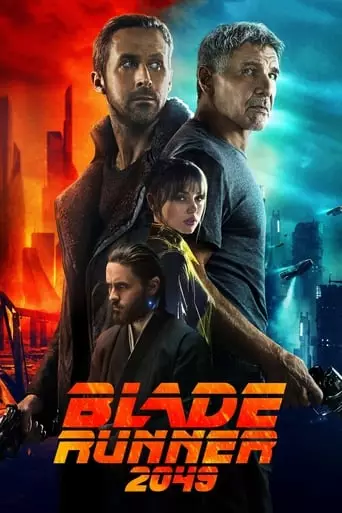Thirty years after the events of the first film, a new blade runner, LAPD Officer K, unearths a long-buried secret that has the potential to plunge what’s left of society into chaos. K’s discovery leads him on a quest to find Rick Deckard, a former LAPD blade runner who has been missing for 30 years.
Blade Runner 2049, directed by Denis Villeneuve, is a visually stunning and thematically profound continuation of Ridley Scott’s iconic Blade Runner (1982). Set thirty years after the events of the first film, it explores existential themes of identity, humanity, and the impact of artificial intelligence.
The story centers on Officer K (Ryan Gosling), a replicant blade runner working for the LAPD. K is tasked with hunting down older model replicants, but his life takes an unexpected turn when he uncovers evidence suggesting that a child—believed to be impossible due to the genetic engineering of replicants—was born to a human and a replicant. This discovery sets K on a quest to find the child, which could revolutionize the relationship between humans and replicants.
K’s journey leads him to uncover the truth about his own identity, which is entangled with that of the child, and ultimately brings him face-to-face with Rick Deckard (Harrison Ford), a former blade runner believed to be hiding due to his connections to the child. As K learns more about the origins of the child, the narrative delves into the mystery of memory, reality, and the search for purpose.
Themes of Blade Runner 2049
- Memory vs. Reality: A central theme in the film is the nature of memory. The idea that memories can be implanted in replicants—created by Dr. Ana Stelline (Carla Juri)—is explored deeply. The line between real and artificial is blurred, and this affects the characters’ perception of themselves and their reality. K’s journey is about reconciling the memories he believes are his with the realization that they were fabricated.
- What Makes Us Human?: The film continually challenges the viewer to question what constitutes humanity. The replicants, who were originally seen as mere tools for exploitation, exhibit human traits such as love, desire, and sacrifice. K’s journey explores whether a replicant can transcend its programming to experience true emotion and free will, a central question in the sci-fi genre.
- Existential Search for Purpose: Both K and Deckard grapple with questions of meaning in their lives. K’s quest to find the child is not just about uncovering a secret, but about finding his own identity and place in the world. The film portrays the search for self-actualization as a universal struggle, whether human or replicant.
- The Ethics of Artificial Intelligence: The film critiques the exploitation of artificial life forms, questioning the morality of creating beings to serve human desires. The treatment of replicants as second-class citizens highlights the ethical implications of technological advancements and artificial life, which mirror contemporary debates on AI and robotics.
- Environmental Decay and Dystopia: Villeneuve paints a bleak future where the world is in ecological collapse, a key element that ties into the visual style of the film. The barren, polluted landscapes emphasize the degradation of both the environment and society. This dystopian backdrop underscores the consequences of technological hubris and social inequality.
10 Reasons to Watch Blade Runner 2049
- Stunning Visuals: The cinematography by Roger Deakins is breathtaking. From expansive landscapes to intimate moments, the visuals create a hauntingly beautiful world that is as immersive as it is striking
- Exploration of Identity: The film’s exploration of identity, memory, and what it means to be human is thought-provoking and deeply philosophical
- Ryan Gosling’s Performance: Gosling delivers one of his best performances as Officer K, capturing the emotional depth and internal conflict of a replicant searching for purpose
- Harrison Ford’s Return as Deckard: Ford’s portrayal of Deckard adds a layer of gravitas to the film, and his scenes with Gosling are emotionally charged
- Rich World-Building: The film expands upon the universe of Blade Runner, providing deeper context about the dystopian world and the replicants that inhabit it
- Complex, Thoughtful Script: The film doesn’t offer easy answers but invites deep reflection on complex themes like free will, technology, and society
- Memorable Soundtrack: The haunting score by Hans Zimmer and Benjamin Wallfisch enhances the film’s immersive atmosphere
- Visually and Thematically Compelling Sequel: Unlike many sequels, Blade Runner 2049 builds on its predecessor without rehashing it, offering a fresh perspective while maintaining the philosophical depth
- Feminist Undertones: The film addresses issues of gender, with several female characters—like Joi and Luv—being depicted as both powerful and tragic, exploring the limitations and objectification imposed on them
- Memorable Action Sequences: While primarily a slow-burn philosophical film, Blade Runner 2049 delivers several intense action sequences, especially the showdown between K and Luv
What Will You Feel After Watching?
After watching Blade Runner 2049, you may experience a mix of awe and contemplation. The stunning visuals and immersive world-building will likely leave you feeling both entranced and reflective. You’ll be left pondering deep questions about the nature of existence, identity, and humanity. The film’s slow pace and somber tone might make you feel melancholic or introspective, particularly as the characters grapple with existential dilemmas. The emotional weight of the ending, especially K’s selfless act, will evoke feelings of sadness and catharsis. Ultimately, the film is not just a sci-fi spectacle; it’s a meditation on the human condition, making you question what it means to be alive and whether artificial beings can truly experience life as humans do.

